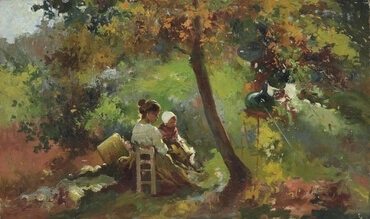1
Und Abram zog herauf aus Ägypten, er und sein Weib und alles, was er hatte, und Lot mit ihm, nach dem Süden.
2
Und Abram war sehr reich an Vieh, an Silber und an Gold.
3
Und er ging auf seinen Zügen vom Süden bis Bethel, bis zu dem Orte, wo im Anfang sein Zelt gewesen war, zwischen Bethel und Ai,
4
zu der Stätte des Altars, den er zuvor daselbst gemacht hatte. Und Abram rief daselbst den Namen Jehovas an.
5
Und auch Lot, der mit Abram zog, hatte Kleinvieh und Rinder und Zelte.
6
Und das Land ertrug es nicht, daß sie beisammen wohnten; denn ihre Habe war groß, und sie konnten nicht beisammen wohnen.
7
Und es gab Zank zwischen den Hirten von Abrams Vieh und den Hirten von Lots Vieh. Und die Kanaaniter und die Perisiter wohnten damals im Lande.
8
Da sprach Abram zu Lot: Laß doch kein Gezänk sein zwischen mir und dir und zwischen meinen Hirten und deinen Hirten; denn wir sind Brüder!
9
Ist nicht das ganze Land vor dir? Trenne dich doch von mir! Willst du zur Linken, so will ich mich zur Rechten wenden, und willst du zur Rechten, so will ich mich zur Linken wenden.
10
Und Lot hob seine Augen auf und sah die ganze Ebene des Jordan, daß sie ganz bewässert war (bevor Jehova Sodom und Gomorra zerstört hatte) gleich dem Garten Jehovas, wie das Land Ägypten, bis nach Zoar hin.
11
Und Lot erwählte sich die ganze Ebene des Jordan, und Lot zog ostwärts; und sie trennten sich voneinander.
12
Abram wohnte im Lande Kanaan, und Lot wohnte in den Städten der Ebene und schlug Zelte auf bis nach Sodom.
13
Und die Leute von Sodom waren böse und große Sünder vor Jehova.
14
Und Jehova sprach zu Abram, nachdem Lot sich von ihm getrennt hatte: Hebe doch deine Augen auf und schaue von dem Orte, wo du bist, gegen Norden und gegen Süden und gegen Osten und gegen Westen!
15
Denn das ganze Land, das du siehst, dir will ich es geben und deinem Samen auf ewig.
16
Und ich will deinen Samen machen wie den Staub der Erde, so daß, wenn jemand den Staub der Erde zu zählen vermag, auch dein Same gezählt werden wird.
17
Mache dich auf und durchwandle das Land nach seiner Länge und nach seiner Breite; denn dir will ich es geben.
18
Und Abram schlug Zelte auf, und kam und wohnte unter den Terebinthen Mamres, die bei Hebron sind; und er baute daselbst Jehova einen Altar.







